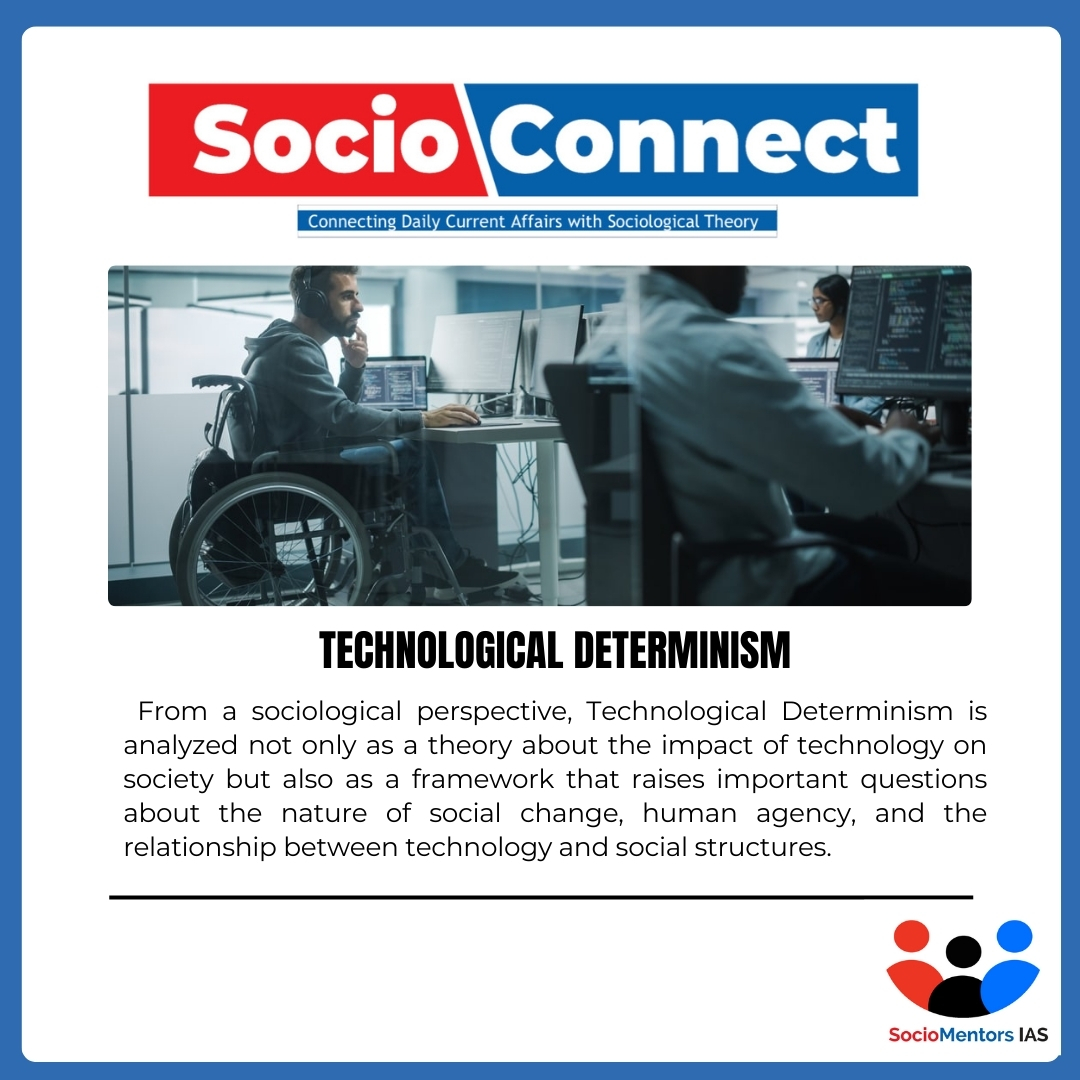Technological Determinism – UPSC Sociological Perspective
October 1, 2024
Technological determinism is a reductionist theory which points to technology as the driving force of development in society – its belief is that a society is defined by its technology. The term was conceived by Thorstein Veblen (1857-1929), a Norwegian-American sociologist and economist.
Main tenets of Technological Determinism
Burnett and Marshall (2003) identify the following important elements of Technological Determinism:
- It assumes that any dominant technology will inevitably result in major cultural/social changes. This seems to be especially true with the dominant communication technology of the time. The influence/effect of the papyrus, the first printing machines, the newspaper, the broadcast media are considered important evidence.
- With technology being so influential, it is assumed that the influence may be for better or for worse. There are supporters of technology and of what it can achieve, as well as critics of technology and what it might mean to our future. The best example of this is nuclear technology. In communications, the mass media face the paradox of being both a boon and a bane to society and culture; as agents of integration and disintegration; as agents that provide continuity to culture and as agents that erode our culture.
- Technological Determinism is a kind of summarising or narrowing down of all possible influences on society and culture into one generalisable unit; thus making it a ‘reductionist’ approach to the understanding of the present and future societies.
How Technology is Deterministic in Contemporary Societies:
- Technology Shapes Economic Systems: Technology has become a key driver of economic systems, influencing production, labour, and consumption patterns. The rise of platforms like Uber, Amazon, and Airbnb shows how technology can reshape entire industries, leading to gig work, e-commerce, and the global digitization of services. These platforms are altering the labour market and the way consumers engage with businesses.
- Influence on Politics and Governance: Elections around the world are influenced by online platforms, either through advertising, micro-targeting, or misinformation campaigns. Platforms like Facebook, Twitter, and YouTube shape political discourse, often amplifying misinformation, fake news, and propaganda. The Arab Spring, for example, is often cited as an event that was driven in part by the organizing power of social media.
- Sociologist Gouldner’s study on the key political changes in modern political history also linked them to the dominant communication technology of the day. Printing and newspapers brought in new ideologies of the literati; whereas broadcast media, being truly mass in nature, resulted in a decline of ideologies of the intelligentsia and the growth of a new mass culture. According to McQuail (2010), a continuous decline in ideology can be anticipated with the rising popularity of the Internet and other computer-based networks of information.
- Shaping Culture and Human Behaviour: Technology influences human behaviour, interpersonal relationships, and cultural values. The proliferation of smartphones, social media, and messaging apps has changed how people communicate and form relationships. Concepts such as “social media addiction” highlight the deterministic role of technology in shaping modern social behaviour. According to McLuhan, the personal and social influence of the medium depends upon the introduction of new technologies or the new extension of ourselves. Therefore, he argued, the medium is the message which made him a communication technological determinist.
- Technology and religion: The internet has enabled the rise of virtual churches, online worship services, and religious communities that transcend geographical boundaries. Social media platforms allow religious leaders to reach global audiences, while apps and websites facilitate religious education and prayer practices.
- Technological determinism and family: Technological advancements have also redefined family structures and traditional roles within the household. The rise of telecommuting and remote work, enabled by digital technology, has blurred the boundaries between home and work life. This flexibility can allow parents to spend more time at home with their children, but it also creates challenges, such as managing work-life boundaries. In cases where family members live apart due to migration, work, or study, technology allows them to maintain relationships through video calls, messaging apps, and social media, reducing the sense of isolation and helping sustain long-distance relationships.
Criticism of Technological Determinism
- Croteau and Hoynes (2000) criticise the theory of Technological Determinism because it lacks the human element. Technological Determinism according to them seems to imply that people are used by technology, rather than the other way round. Both viewpoints have to be considered to understand the relationship between media and society. The authors point out that it is important to consider the social forces that developed and accepted media technology in order to appreciate their significance. Further, the authors argue that to consider the message as not separate from the medium is an oversimplification of the media communication process.
- According to Vanderburg (2012), before technology can be considered deterministic or autonomous, it has to satisfy three parameters: It must have the capacity to encompass to a great extent, the way of life in a society. Second, culture should place on it (technology) a very high value. Third, technology should be dominant enough to diminish the role of the symbolic way of living that is culture. He opines that relationship between technologies and societies are always reciprocal.
- The Social Shaping of Technology (SST) believes and tries to show that technology is a ‘social product’ (Williams and Edge, 1996). The fact that society dictates the creation and use of a technology indicates the presence of choice. SST theories therefore attribute the success or failure of a technology to the acceptance/rejection of the technology by society. These choices may result in successful technologies being developed cumulatively since they prove to be profitable. It could also result in stability of certain innovations, or a reversal of earlier choices.
Thus, to summarize, while technological determinism emphasizes the power of technology to shape society, it often overlooks the role of human agency and social contexts in mediating these changes. Social structures, cultural values, and individual choices all play significant roles in how technology is adopted and integrated into daily life. Technological determinism serves as a reminder of the profound influence that technological innovation can have on social systems, but it also invites critical reflection on the need for a more nuanced understanding. Rather than seeing technology as an independent force driving change, it is important to recognize the reciprocal relationship between technology and society—where society not only adapts to technological advancements but also actively shapes the development and use of technology.



